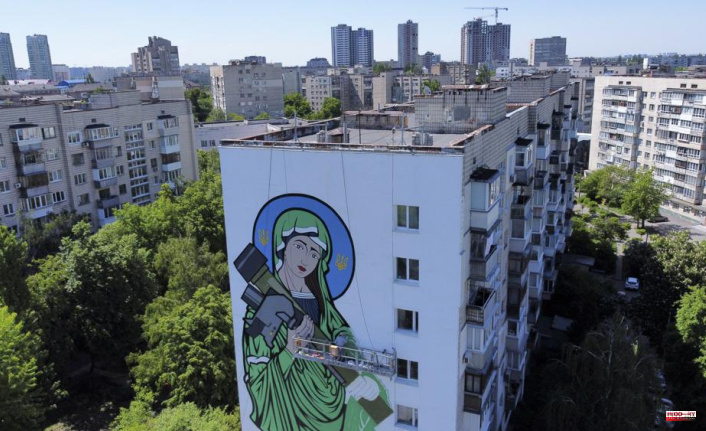A piano music echoed from an apartment block in Kramatorsk on a spring evening, mixing with distant artillery fire to create a surreal soundtrack for a bomb-stricken neighborhood in the eastern Ukrainian capital.
The 3-month-old war seems never far away, no matter where they live.
People living in villages and towns near the frontlines hide in basements, enduring constant shelling and trying to survive without electricity or gas.
Even though the Russian missiles are not within reach of these areas, the constant sirens of air raid remind us that any Russian missile could strike at any moment. This includes those who walk their dogs, ride their bikes, or take their children to the parks of cities such as Kyiv, Odesa, and Lviv.
Checkpoints, curfews, and fortifications are all commonplace. As Moscow intensifies its attack in eastern and south Ukraine, so are new cemeteries, uprooted villages, and war-scarred areas.
"City residents are trying back to normal life, but with each step they stumble upon either a crater, a ruined home or a grave in their yard," stated Andriy Pustovoi, speaking to The Associated Press by telephone from Chernihiv. While no one is currently cooking over a bonfire or drinking from a river, there are still many steps to take to get to a normal lifestyle.
Chernihiv was directly in the path of Russian forces when they advanced towards Kyiv in the early stages of the war. It was heavily bombed and Vladyslav Atroshenko, the Mayor, stated that about half its buildings had been damaged or destroyed. A part of the city park houses a cemetery where some of those who were there were buried.
The streets of the city are almost empty, and half of the shops have closed. Public transportation is also not functioning properly, according to Pustovoi, a 37 year-old engineer.
The rail service to Kyiv was restored only this month. However, people who fled are not in a hurry to return.
Atroshenko stated that the most frightening thing was that Belarus and Russia are not leaving Chernihiv. This means that some residents who fled when the war began may not return.
There are few people seen in Kramatorsk's streets. Storefront windows are often boarded up or covered by sandbags.
There have been several attacks on the eastern city, including one that struck close to its train station. This was just before the fighting escalated. The plaza became a horror scene in an instant. Bloody bodies were found on the pavement and discarded bags littered around it. Over 100 people were also hurt and 57 people died.
Kramatorsk, one of the largest cities in eastern Ukraine's industrial Donbas region, has not been overthrown by Russian forces. Since 2014, the region has been the scene of fighting between Russian-backed separatists (and Ukrainian government forces)
The picture is worse elsewhere in the Donbas.
Ryisa Rybalko fled Novomykhailivka where she lived in a basement, then in a bomb shelter at school due to frequent shelling.
"We have not been able see the sun for three month." Rybalko stated that we are nearly blind due to three months of darkness. Rybalko arrived in Kiurakhove with her family, drove by a villager, and waited for a bus to go west on Monday.
Dmytro Khaliapin her son-in law, claimed that their village was being pounded with artillery.
"Houses have been destroyed." He said, "It's a horrible sight."
Lida Chuhay, an 83-year old woman from neighboring Luhansk, fled Lyman, which was also close to the front line, and returned to her home in the province of Luhansk.
"Ashes, ruins. She said this Sunday, as she sat in a train going west from Pokrovsk. "Literally, everything is on fire: buildings, houses, everything."
Lyman, Chuhay, and other Lymanites claimed that much of the town was destroyed by the bombardment. Because it is too dangerous for anyone to venture outside, those who remain are hiding in shelters.
Olha Medvedeva, who was sitting next to Chuhay on the train, said that "they ruined everything." "Everything flew away from the five-story building in which we lived -- the windows and the doors," Olha Medvedeva said.
Air raid sirens can be heard in cities further from the frontlines. Few people pay attention to them and go about their day.












